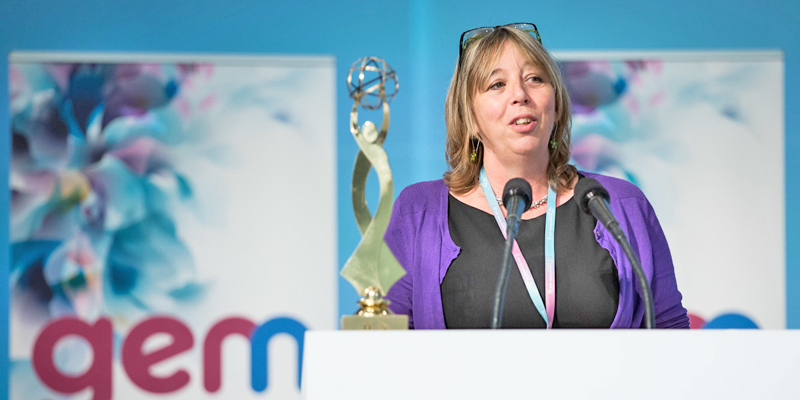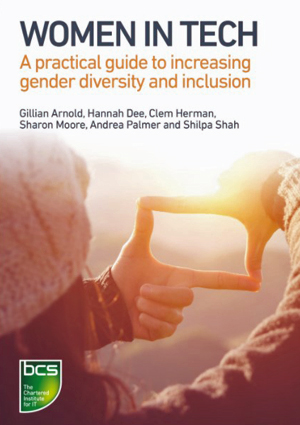Gillian Arnold is managing director of Tectre, an IT recruitment and training company focussed on supporting women in technical roles. She has spent more than three decades in the IT hardware and software industry, including within IBM in the UK, in IT training, technical support, marketing, technical management, sales, business development and market strategy roles. Gillian spent 11 years as a non-executive director for WISE and currently chairs the Women in IT Taskforce for CEPIS, the Council of European Informatics Societies, as well as sitting on the board at the BCS, the chartered institute for IT, having edited and co-authored their new book about increasing gender diversity and inclusion in tech.

“One of the very top roles in tech is the role of an architect. There are lots of different types of architect. Those who put together the infrastructure, those who architect the whole application from end to end, those who architect the way that data flows around the applications and infrastructures. These are some of the really exciting roles, and yet, in the UK, the numbers are supposed to be around 5% women … personally, my experience suggests that there are even fewer than this.”
That eureka moment
I won a place at grammar school and studied for A-levels. When I failed (all of them!) I sobbed for a day and then took off to London to find my fame and fortune. Fortunately, a manager for an electrical company took pity on me at interview, told me he couldn’t employ me but knew someone who was looking for people like me to work in IT roles, and gave me an agency name. I never looked back.
I loved working with technology. I loved the mental agility that it required of me. I was absolutely delighted to get a job teaching at IBM, but was enormously weighed down by impostor syndrome in the first few weeks. All the other trainers were Oxbridge educated and exclusively male! I didn’t let on that I had failed all my A-levels and didn’t have a degree – but I really felt as though I shouldn’t be there.
One day one of them commented that they didn’t teach a particular technology ‘because nobody used it in the real world, and (they) didn’t understand it anyway!’ I knew it was a complicated technology, and I also knew that EVERYBODY used it because it was an essential part of business at the time. I understood, in a eureka moment, that I had a practical skill that all of their academic training couldn’t give them.
From that moment onwards, I didn’t look back but recognised my own right to succeed. As that right was thwarted over the years, and the glass ceiling started to tell on my progress, I knew that I needed to work on the issues for women in the industry. I became a really active member of the IBM UK Women’s Leadership Team and gained heaps of experience in working with women and diversity. I spent over twenty years at IBM in lots of exciting technical roles before leaving and setting up my own company, Tectre.
Supporting women in STEM across the UK and Europe
WISE was one of the first external roles I took in support of women in STEM. My understanding of the issues, built from the work I had done inside IBM, could be translated into support for all women in STEM, not just the 6,000 inside IBM UK.
I became a member of the board and thoroughly enjoyed the eleven years I worked with WISE. The work was varied, fun, challenging, and grew my skills. I guess halfway through that period, I started to advise other women to get an external role if they couldn’t get through the glass ceiling. It teaches you a set of skills you don’t already have and enhances what you can bring back to your day-to-day workplace.
Alongside this, I became chair of BCSWomen, a group within the Chartered Institute for IT that supports women in technology. Again, an external role which taught me so many new skills. The biggest of these was ‘how to manage a team of volunteers with busy lives’. I had to learn that the cause I was leading wasn’t always the thing that was most important in their lives, and how to manage deadlines under those circumstances.
At the moment I am leading the Women in ICT Taskforce for CEPIS, the Council of European Professional Informatics Societies. The learning from this is amazing. I am gaining experience of working with the EU and the commissioners, and learning about all of the different cultures in the countries we represent. I am also learning that, in some ways, things are pretty easy in the UK.
Our collective opportunity to improve business behaviours
Today I run a recruitment and training company. We recruit for diversity, particularly women in STEM careers. We also do training in diversity, since we recognise that if you don’t get why you are doing diversity, and particularly if you haven’t understood the need to manage your own biases then it would be incredibly difficult to attract, retain and value diverse teams.

When the lockdown started in March 2020 I could see that the recruitment side of the business would really suffer. People were barely holding on to their jobs, never mind looking to recruit new people. So I focussed on the training and made everything we did available as a Zoom workshop. I put our training online and reworked the materials to make them viable over Zoom and Teams. We have been training on sexism, racism and unconscious bias ever since.
The Black Lives Matter movement has made what we do much more relevant this year, and so we have been, and remain, very busy. This is our collective opportunity to ensure that social and business behaviours and opinions are questioned and improved.
Gender balance is STUCK
When it comes to gender balance in tech, we are STUCK. We have been stuck in the UK with about 16-17% women in technical roles. It has been that way since the start of the century. I guess we should be grateful that we are doing better than some of the other countries in greater Europe, but it isn’t reasonable to only have one-sixth of the workers in tech as women.
What this means is that only one-sixth of the technical innovations have a female perspective built into them, only one-sixth of AI has a female viewpoint. This can lead to really one-sided developments. Teams (mostly women) have been working to increase the numbers of women in tech in the UK for two decades, and so, I have a feeling that we would be much worse statistically, but for the efforts of those groups. For the first time in 2020, we saw an increase in the numbers of women entering higher education to study tech subjects. Let’s hope the figures continue to improve.
The benefits of bringing together diverse talent
We have been saying that we would write a book for some years. We know that there are guides out there for supporting young women through the higher education systems and some books have come out of the US with information for education leaders on attracting and retaining women on courses.
Our book is for business and institution leaders who want to understand how to bring more women into their technical teams and subsequently keep them in the business. We have couched it all in terms of the benefits that companies can achieve from bringing diverse teams together because we are convinced that the moral arguments (sadly) don’t cut it when there are so many other priorities for CEOs and CIOs.
We have included practical ideas on how to ensure that you have access to the widest number of women with the right skills, how to establish projects to bring women in, and what needs to be done to ensure that once women enter the organisation, they feel that they are valued and will want to stay.
Breaking down negative tech stereotypes of ‘brogrammers’
It would be great to see examples of women techies in the media. For too long, the male stereotypes have formed our opinions of what a techie looks like. Wouldn’t it be fantastic to see new role models? Superhero women who are changing the world by architecting exciting technical solutions which cater for everyone.
The media organisations, casting teams, artistic directors and everyone involved in films, drama, soaps and advertising could help to shift the cultural and societal concept we have of a male techie and present us with some really interesting women instead. Not too much to ask!
Tech is not just about coding
One of the very top roles in tech is the role of an architect. There are lots of different types of architect. Those who put together the infrastructure, those who architect the whole application from end to end, those who architect the way that data flows around the applications and infrastructures. These are some of the really exciting roles, and yet, in the UK, the numbers are supposed to be around 5% women … personally, my experience suggests that there are even fewer than this.
We need to ensure that women see that these roles are there for them, that women architects are in demand, and that they bring a different perspective to the solutions that they create. Coding isn’t the only role in tech. We also need to make it clear that creativity is deeply embedded in many of the jobs that technologists do, and so, if you thought that tech was not creative, think again. The messaging needs to start young … let’s get CBBC creating female characters which who use and create technology in exciting ways.
Shifting cultures
I am developing courseware on inclusive leadership. I love teaching unconscious bias and really enjoy the everyday challenge of helping people to understand how their own socialisation has created the opinions that they use daily. I think there is a need to shift cultures in the UK companies and organisations though.
Often, when questioned, women cite the culture of an organisation as being something that could improve. I have always been conscious that the executives, managers and team leaders set the culture in an organisation, and if they cannot fully embrace inclusivity, then their people get left out, devalued and their talents are wasted. Time to work a fix for this!
https://www.linkedin.com/in/gillian-arnold-fbcs-86b25b1
https://instagram.com/tectre_ltd






